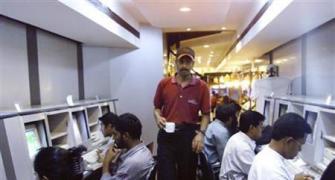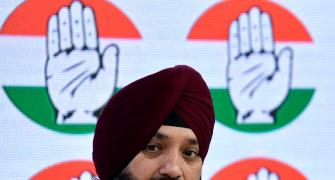 A handbook is generally understood to be a ready reckoner, a quick reference, a flick-through pocketbook, something you pull out when the machinery has failed and so has your memory, or equally, in a moment of moral crisis or verbal vacuum.
A handbook is generally understood to be a ready reckoner, a quick reference, a flick-through pocketbook, something you pull out when the machinery has failed and so has your memory, or equally, in a moment of moral crisis or verbal vacuum.
It would quite hard to put together such a handbook on the subject of climate change, though, given the jungle of acronyms and thickets of controversy that fill this domain.
What we have instead in the Handbook of Climate Change and India: Development, Politics and Governance, is a sweeping panorama of Indian thinking and reasoning on the issue of climate change, on its impacts, on formulating a global regime on greenhouse gas emissions and determining India's place within it, and on national preparedness for an uncertain future.
Much has been said and written on climate change in the Indian media, especially in the run-up to Copenhagen in 2010 and since, but the subject continues to be perceived as specialist even occult domain, accessible only to an extremely fluent and internationally mobile few, who can embrace simultaneously and with ease the data overload, the organizational-legal complexities of the negotiations, the semantic nuances and the language of uncertainty, the multi-disciplinary and high-tech content and the multiplicity of economic taxonomies and future scenarios.
This exclusivist impression is corrected by the Handbook of Climate Change and India, which, by laying out side by side the range of expert views, on the one hand demonstrates the limits (or scope) and limitations of individual expert views, while on the other demonstrating the range of extant scholarship and the synergies and inter-linkages that are potent in these diverse experiences drawn from diplomacy, policy making, politics, academics, environmental activism, science and technology, agronomy, meteorology, urban design, water management, governance, etc.
The Handbook makes the subject available and accessible to a wide audience, while preserving its essential techno-economic, ethical and policy content.
The international negotiations have found India largely on the defensive, defending our 'right to development', preventing incursions into our space.
The underlying win-lose paradigm can be challenged in the context of a globalising economy, where the so-called losers will bring at least a part of the winning team down with themselves.
While this challenge is not offered in the writings, except obliquely in the observations of the invited Western commentators, the book provides rich narratives in defence of the traditional Indian negotiating positions, while allowing the emerging divergences and nuances to gently surface.
The felt need for a compelling Indian articulation, consistent with core values espoused by the nation's leaders past and present, but meeting the needs of a new era -- a potent linking of the past with the future -- echoes through the volume.
Stirrings of unease at the unraveling of new geopolitical configurations, where India stands apart from China and both stand apart from the small island nations and other traditional allies, can also be heard.
A significant contribution of the compendium is the precipitation of the view that climate crises will expose the weaknesses of India's governance systems and institutions, their bases and biases, thereby simultaneously exacerbating the crisis and offering a chance for renewal.
This observation comes predominantly from activists working on ground-level issues of empowerment, forest management, water management, and the like, who see the present debate as a curtain raiser to a wider debate on institutional effectiveness.
On the flip side, the least mature link, quite counter-intuitively, appears to be Indian industry.
A belief that it only needed to play second-fiddle to government in this matter has led to Indian industry largely assuming a short-termist view, focusing on small negotiating returns, such as the Clean Development Mechanism, a provision that was added to the UN Kyoto Protocol in order to provide relatively cheap short-term greenhouse gas offsetting options, and to kick-start a broad-based
While CDM offsets have strengthened the project economics for certain types of projects in the short to medium term, it has not resulted in, nor was it designed to, deliver technology leap-frog or other long-term benefits.
Energy efficiency and elimination of waste are among the first fruits to be picked in a low-carbon journey, and an enabling policy environment has been set up by government by way of the energy star rating programme, building energy conservation codes, Perform-Achieve-Trade mechanism and other measures.
Uptake of these standards by Indian industry is a necessary but not a sufficient step. Individual companies' claims regarding 'greening' their businesses by and large fall far short of the need of the hour.
A clear articulation of the long-term competitive and strategic positioning and the perceived threats to and opportunities for Indian industry in a climate-challenged world has not been forthcoming. This lacuna in the Indian story is revealed in the reading.
A second weakness, similarly surprising in view of the verbiage that is seen around this topic, is in the articulation of the technology implications, issues and priorities, on which again we do not seem to have a fix, except for relatively obscure and generic observations about solar and nuclear power and clean coal technologies.
Although there may be exceptions, for example in the realm of smart grids, we do not hear a clear articulation of what India needs and how it might achieve those technology goals.
An articulation of the high potential technologies, their costs, timelines, material requirements, social and environmental implications and of strategies that will steer us away from R&D 'business as usual', that is also linked with commercial aspects relating to the availability and economics of coal and gas (LNG) imports, for example, and of indigenous innovation capability and its enablers, is a large challenge but not one that we can afford to shy away from.
Linked with this is the ubiquitous issue of energy options, and some of these issues are touched upon in the discussion of electricity demand.
However, the Handbook does not offer satisfactory answers to the vital question of how the so-called knowledge economy will be leveraged to provide technical solutions for climate change.
"Per capita plus" and "co-benefits", the new watchwords of the Indian climate change establishment are indeed powerful coinages, referring respectively to the negotiating position and to the prioritized actions towards a less carbon intensive economy.
They provide steps in the articulation of a coherent national strategy, and have rightly been hailed as significant conceptual break-throughs.
However it may be argued that they do not encompass the full scope of the challenges mentioned above and are indeed steps and not the destination.
The vibrant discussions in the diplomatic, policy and development sectors are thus, in the view of this reviewer, not equally matched by the limited selections offered on business and technology.
Nonetheless, the powerful coverage of a wide spectrum of issues allowing a diversity of viewpoints and reasoning, reveal a fine sensibility and balance in the selection of materials, presenting for the first time a coherent 360 degree view of climate change thinking in India.
A must-read for all aspiring scholars, enthusiasts and professionals in this domain.
Book Review: Handbook of Climate Change and India -- Development, Politics and Governance, Edited by Navroz K. Dubash, Oxford University Press, pp 400; Rs.1250The author has managed climate policy, renewable energy and sustainable development for Shell in India. Views are personal.








